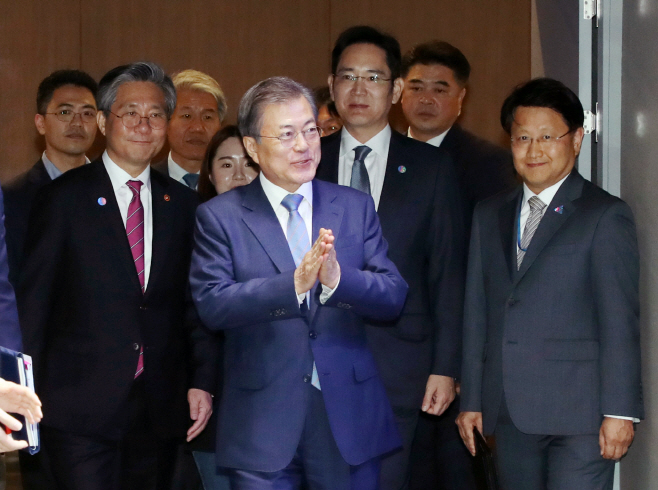After witnessing US President Joe Biden hold up a silicon wafer in front of the world’s chip industry leaders, including Samsung Electronics, calls are growing in South Korea that its leader, too, should act to help safeguard Korean chipmakers from an unfolding global war for chips.
Despite Korea’s unchallenged position in the global memory chip market, industry officials and pundits worry the country could fall victim to the global power struggle between the US and China, and could possibly lose its competitiveness in the semiconductor industry.
Stung by such concerns, the Korean government belatedly revealed it had a closed-door meeting with high-level officials from Samsung Electronics on Friday to discuss a “wide range of current issues” across the industry.
The country’s top economic policymaker Hong Nam-ki is also holding a meeting with top executives of Samsung, SK hynix, Hyundai Motor and some shipbuilders on Thursday.
While there are views that Seoul’s actions have come later than they should have, some experts have pointed out the Moon Jae-in government did announce a semiconductor strategy in 2019 that could be of help, if well executed.
Similar to Biden’s $500 million budget for the US chip industry, President Moon pledged to spend 1 trillion won ($896 million) on expanding national-level research and development for chip technologies as part of the government’s policy toward making Korea the No. 1 integrated device manufacturer by 2030.
Moon also demonstrated a similar symbolic gesture of signing his autograph on a silicon wafer.
Samsung then announced a 133 trillion-won investment plan to boost its non-memory business, including the fabless and foundry business for 10 years.
“We disagree with the views that Moon hadn’t done anything,” said an industry insider. “What Biden’s doing now in a very early stage of his administration seems like a deja vu of the Moon government in its earlier period.”
However, the government has not been able to make much headway on that front since the policy announcement, industry officials said.
“Since the government considers the chip industry stabilized and profitable enough, it has a relatively conservative stance on supporting the industry,” one official said. “The government’s focus on semiconductors has been limited to supporting small fabless firms and suppliers of materials and equipment in terms of employment, not for R&D.”
During the April 9 meeting between Industry Minister Sung Yun-mo and chip industry executives, the participants felt that the government has focused on putting more weight on maintaining equity among different industries than making a specific industry more competitive, according to industry sources.
“Tax incentives for new investments and R&D achievements, which could directly lead to better profitability, are needed the most for the industry,” the official said.
The semiconductor industry is the backbone of South Korea’s export-driven economy, with chips accounting for 19.4 percent of the country’s total exports in 2020. Samsung Electronics, the world‘s largest producer of DRAM chips, is Korea’s biggest company by profit, sales and market valuation.
Industry representatives call for effective measures that would address practical problems in the industry.
“Biden is talking about semiconductors, not for the sake of semiconductors,” said Ahn Ki-hyun, senior executive director at the Korea Semiconductor Industry Association. “The US is using semiconductors to salvage its automobile industry struggling to secure chips amid a global shortage, which means we shouldn’t follow what the US is doing.”
“For the Korean semiconductor industry, the government needs to devise measures for deep localization and improving working conditions at manufacturing facilities as well as fostering bright talent,” he said.
Among the myriad of issues, active government support to foster a competitive semiconductor workforce at a national level is the key priority, they said.
On Wednesday, Industry Minister Sung made a visit to Seoul National University’s Inter-University Semiconductor Research Center with a government plan to nurture 4,800 new talents in the industry over the next two years.
By Song Su-hyun (
song@heraldcorp.com)







![[Today’s K-pop] Blackpink’s Jennie, Lisa invited to Coachella as solo acts](http://res.heraldm.com/phpwas/restmb_idxmake.php?idx=644&simg=/content/image/2024/11/21/20241121050099_0.jpg)
